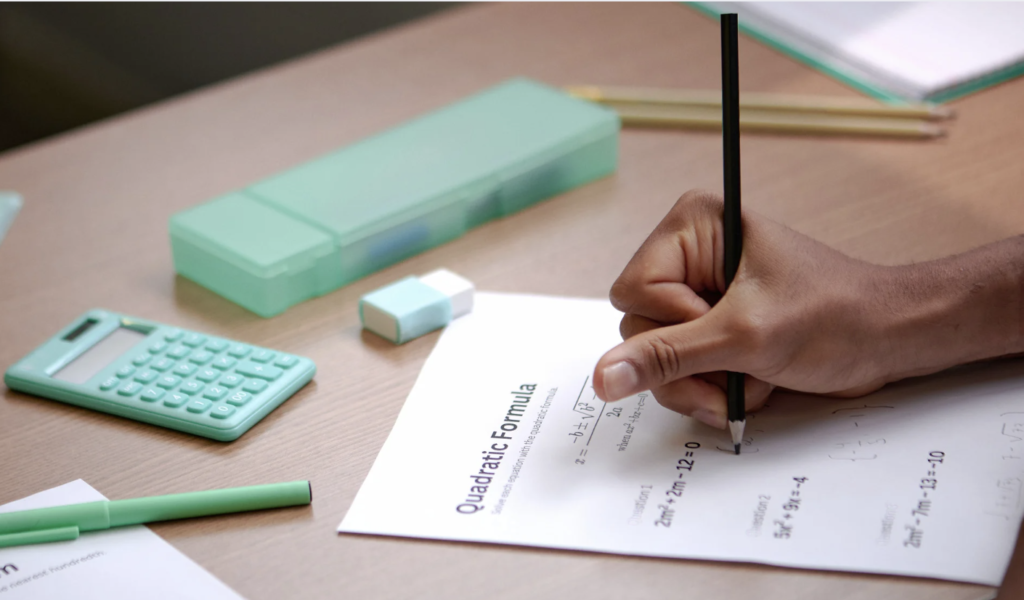7 Warning Signs Your Child Needs Extra Math Help (And What to Do About It)
Math can be a challenging subject, but how do you know if your child is just struggling with a tricky topic or if they truly need extra math help? As a parent, identifying the signs early can make a huge difference in ensuring they get the support they need to boost their confidence and performance.
In this post, we’ll cover the seven key warning signs that your child might need additional math support—and what you can do to help.
Contents
1. Not Improving Math Grades (Despite Effort)
1. Their recent test scores have gone down.
2. Their homework remarks are inconsistent.
3. They study but don’t see improvement.
If your child’s maths grades are slipping despite their effort, it may indicate gaps in their understanding. A drop in performance can be due to difficulty grasping complex topics like algebra, fractions, or problem-solving.
Speaking with their teacher can help pinpoint which areas they find most challenging. A structured approach, such as targeted online learning tools or one-on-one tutoring, can provide the personalised maths support they need to rebuild confidence and boost their scores.
2. Avoiding Math Homework and Tests
1. They procrastinate or rush through maths homework.
2. They “forget” about upcoming tests.
3. They seem frustrated or overwhelmed when solving maths problems.
When a child avoids math homework or acts like they’ve forgotten about a test, it’s usually not because they’re lazy. More often, it means they’re feeling anxious or stuck. If they don’t fully understand the basics, then harder topics like algebra or word problems can feel impossible. That frustration can turn into fear, and fear makes them avoid math altogether.
To help, focus on rebuilding their confidence step by step. Instead of long, stressful study sessions, try shorter ones where they feel safe to make mistakes and ask questions. Bring math into everyday life, e.g., asking them to help with prices when shopping or measuring things while cooking. When maths feels useful and less scary, it becomes easier to face. And once they stop avoiding it, real progress can begin.
3. Lack of Confidence in Their Math Abilities
1. They say, “I’m just not good at maths.”
2. They compare themselves negatively to classmates.
3. They hesitate to answer maths questions, even when they know the answer.
When a child starts saying things like “I’m just bad at math,” it’s often because they feel like they cannot keep up with others. Struggling in class can damage their confidence, and the more they compare themselves to classmates, the more they believe they will never get it. That belief can make them stop trying, even when they are close to understanding.
Changing how they think about math is important. Remind them that math is not about being naturally smart. It is a skill anyone can build with practice. Praise their effort, not just correct answers, and notice when they try, even if they make mistakes. Small successes, like solving a problem on their own, can build real confidence and help them feel more capable over time.
4: Struggling with Basic Concepts or Forgetting Previous Topics
1. They have difficulty remembering math concepts learned a few months ago.
2. They struggle with basic calculations (e.g., multiplication, fractions, decimals).
3. They solve a problem one day but forget how to do it the next.
If your child repeatedly forgets previously learned math topics, it might indicate that they never fully understood them in the first place. This can lead to difficulties as math builds on prior knowledge, making it harder to grasp new concepts like algebra, percentages, and probability.
Many parents hope their child can catch up quickly, but lasting progress in math rarely happens overnight. The key is to help them rebuild their understanding at their own pace, one small step at a time. Rushing through topics often leads to more confusion, not clarity. When your child has the time to truly grasp the basics, they become more confident and better prepared for the harder topics ahead.
A Student’s Perspective
“If I’m stuck on a math problem, I just take a picture and ask the AI solver. It’s so cool, it explains everything until I get it!”

- @QuantumLearner
Grade 9 student
5. Taking Too Long to Solve Basic Math Problems
1. They take significantly longer than their peers to complete basic calculations.
2. They struggle to apply efficient problem-solving techniques.
3. They lose track of the steps in multi-step problems.
If your child spends an unusually long time on simple arithmetic problems, it may be a sign they are struggling with fluency in basic math operations. This can slow their progress with more advanced topics like fractions, algebra, and multi-step problem-solving.
To help, your child needs more than just repetition, they need tools that make the basics stick. At Math Angel, we combine clear explanations with visual design and animation to make math concepts easier to understand and remember. This approach builds both speed and confidence, laying the foundation for stronger performance in math class.
6. Struggling to Apply Feedback and Corrections
1. They often ask for help with simple maths problems that they have been taught before.
2. They rely on others to check or confirm their answers, even for basic calculations.
3. They avoid attempting problems independently and frequently express uncertainty.
If your child often asks for help before even attempting a simple math question, it may be a sign they lack confidence in their thinking. This kind of hesitation often comes from relying too much on memorizing steps rather than truly understanding what they are doing. When they are unsure why something works, they naturally look for reassurance before trying on their own.
To help, focus on building their independence step by step. Encourage them to talk through their thinking out loud, even if they are unsure. Show them that mistakes are part of learning, and praise the way they approach a problem—not just whether the answer is right. Over time, they will start to rely more on their own reasoning and feel more confident solving problems without second-guessing themselves.
7. Teacher Has Expressed Concerns
1. Their math teacher has mentioned they’re falling behind.
2. They need extra time to complete math tasks in class.
3. They struggle to participate in group math activities.
When a teacher raises concerns about your child’s math performance, it is often one of the clearest signs that extra support is needed. Teachers see how your child is doing compared to their peers and can spot issues that may not show up at home—like gaps in understanding or signs of frustration in class.
Take their feedback seriously and set up a time to talk. Ask which topics your child is struggling with. If extra support is needed, look for math platforms that offer clear explanations and regular practice. Whether it is tutoring or structured online learning, acting early can stop small problems from growing into bigger ones.
Quick Parent Checklist:

“If your child shows two or more signs, it may be time to seek extra math support. Getting involved early can make all the difference!”
What's Next ?
How to Help Your Child Succeed in Math
If your child shows one or more of these signs, don’t panic! Early action can turn things around. Here’s what you can do:
Identify problem areas:
Talk to your child, check past homework, and reach out to their math teacher.
Find the right resources:
Use online maths programs, revision guides, or exercises tailored to their struggles.
Make math less stressful:
Keep math learning fun, use real-life examples, and celebrate small wins.
If you like this blog, share it >
Related blogs





